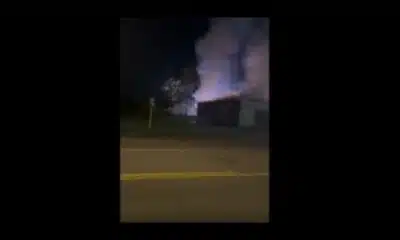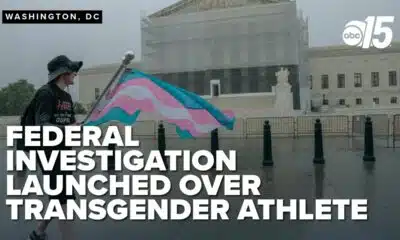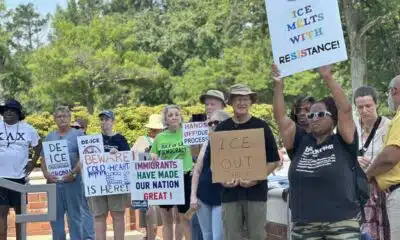News from the South - North Carolina News Feed
1,600 Buncombe voters swept up in GOP ballot challenge, as hand recount proceeds • Asheville Watchdog
Several dozen citizens and election officials gathered Wednesday at the Buncombe County Board of Elections headquarters in downtown Asheville to begin a laborious hand recount of thousands of 2024 election ballots, looking for any discrepancies that might call into question the outcome of a tight race for a North Carolina Supreme Court seat.
Meanwhile, the state Board of Elections is preparing to rule on a related challenge that, if successful, could toss out some 60,000 ballots statewide, including 1,600 cast in Buncombe County.
The North Carolina Republican Party and Jefferson Griffin, the Republican candidate for Seat 6 on the North Carolina Supreme Court, contend that the election boards of all 100 counties improperly counted ballots of ineligible or unverified voters — a claim that will be resolved by the North Carolina Board of Elections — and demanded a “hand-to-eye” count of ballots in all 100 counties. Griffin has the right to do so under law, because of the closeness of the voting.
A statewide machine recount last week confirmed initial election results that Griffin is trailing his Democratic opponent, the incumbent Allison Riggs, by 734 votes out of 5.5 million cast. Republicans currently hold a 5-2 advantage on the state’s highest court, and a victory by Griffin for an eight-year term would make it 6-1 and ensure GOP control of the bench for the next decade.
Riggs claimed victory this week and called for Griffin to concede. Griffin and the state Republican Party refused, saying they would pursue every avenue to reverse the outcome. While the hand-to-eye recount must be completed in five days, the challenge of voter legitimacy could delay the election results indefinitely.
“Our priority remains ensuring that every legal vote is counted and that the public can trust the integrity of this election,” state Republican Party spokesperson Matt Mercer said in a news release. Embry Owen, Riggs’s campaign manager, said Griffin’s protests were a “last-ditch effort to deny the will of voters across the state.”
Final rulings by the state board can be appealed to state court.
The parents of Allison Riggs are among the 60,000 voters whose ballots, the state Republican Party contends, should have been thrown out for a variety of reasons, which include attempting to vote as a felon; casting an absentee or early voting ballot but dying before the election; having official residence outside North Carolina, or lacking validation via the last four digits of a Social Security number or a North Carolina driver’s license.
The bulk of the challenges involve the Help America Vote Act of 2002, which in North Carolina requires voters to provide the last four digits of their Social Security number or their NC driver’s license number. Anyone attempting to vote in 2024 whose voter registration records did not already include the ID numbers should have been required at the polls to provide those numbers.
Under state law, all voters in 2024 were required to show proper identification before being allowed to vote. But there is no uniform method among the counties for capturing that information on voter forms. Even if a poll worker requested and verified a voter’s ID, precinct computers are not linked to any database for security reasons, so no corrections or additions to the registration could be made.
News that their ballots are being challenged came as a surprise to several Asheville voters on the list of 1,600 potentially “fraudulent” voters, they told Asheville Watchdog.
“I’m flattered to be included, but I have no idea what that’s about,” said John R. Nicolay of Asheville, who voted on Election Day with his wife, Ada. “Nobody tried to stop me from voting. We voted at the correct place. We voted in person. We showed proper identification.”
“This is amusing in a very frustrating way,” said Nicolay, whose Buncombe County voter registration records indicate he registered as unaffiliated in 2022 and has voted in three previous elections. Nicolay said he and Ada registered at the same time. Her ballot was not challenged.
Suzanne Escovitz is also on the GOP’s challenge list. She and her husband, Alan, went in person to register at the Buncombe County Board of Elections soon after moving to Asheville in 2008. Her Buncombe voter registration shows that she has voted in 26 previous elections without issue, as a registered Democrat.
“For sixteen and a half years I’ve voted with no problem,” Escovitz said. When she appeared at the North Asheville early voting site last month, “I showed them my driver’s license, which everybody had to do, to prove I am who I am,” she said. “I didn’t do anything wrong.”
“If the Board of Elections didn’t do what they were supposed to do, that’s on them,” Escovitz said, expressing anger that the state Republican Party seeks to invalidate all her votes since 2008. Her husband’s ballot was not challenged.
Given the heavy Democrat advantage in Buncombe, a substantial number of disqualified ballots here presumably would help the Republican candidate.
The recount: ‘hand to eye’
In a process that is repeating in all 99 other counties this week, election workers, administrators, and observers gathered Wednesday at Buncombe County’s Board of Elections building on Coxe Avenue to begin “hand-to-eye” counting of paper ballots.
In a cavernous room filled with rows of voting machines and stacks of ballot containers, four teams of partisan election workers — two Republicans and two Democrats for each — began a four-hour shift examining and tallying ballots. A second shift, also consisting of 16 workers split evenly by party affiliation, was scheduled to relieve them for the afternoon.
Corinne M. Duncan, Buncombe County’s director of elections, said the cost of the hand recount would be borne by Buncombe County taxpayers. Each counter is paid $17 an hour.
Paid election workers, Buncombe Board of Elections staff, and the county’s five board members also worked through last weekend on the machine recount demanded by Griffin. After feeding tens of thousands of ballots into high-speed scanners, the results were verified: The recount did not narrow the margin of Riggs’s lead by even one vote; there was no evidence of any discrepancies that would call the original results into question.
This week, rather than count all the ballots cast in Buncombe last month — more than 161,000 — the hand-to-eye recount that started Wednesday will examine a smaller, supposedly representative sample of 3 percent of all voting locations, chosen at random by the state board. In Buncombe, three sites were selected: the early voting site in west Asheville and two smaller precincts. Election officials estimated that 13,000 votes would be examined in all. Absentee ballots are not included.
By law, if enough discrepancies are found in the selected samples to suggest that the outcome could be overturned if extrapolated to all the state’s voting places, a full hand-to-eye recount of 5.5 million ballots would be ordered.

But no such discrepancies are expected, said Duncan. “This [recount] is sort of a rote following of the law,” Duncan said. “The thing that is tough is that the law doesn’t keep up with technology. With machines that are so accurate, the percentages should be smaller. So we’re being asked to do a lot of work that won’t materially change the results. The machines are all tested before the election. And after the election we do a sample audit. So we’ve already proven that the machines are going at it the right way.”
The hand-to-eye count is made easier this year by the county’s adoption of touchscreen voting machines for early voting. An estimated 12,000 of the ballots to be read this week were produced using ExpressVote XL touchscreens machines.
Unlike hand-marked paper ballots — which require voters to completely ink the inside of a bubble next to the name of the preferred candidate, often leading to incomplete markings, cross-outs, smudges, extraneous scribbles, voting for both candidates, and other mistakes that befuddle a machine reader — the touchscreen printout ballots are relatively clean, and prevent a voter from, say, inadvertently voting for both candidates.
The reviewers sit four to a table, one Republican and one Democrat on one side, verifying the name of the voter and the voter’s intent, calling out either “Jefferson” (for Griffin) or “Allison” (for Riggs). The paper ballots are then pushed to the other side of the table, where, again, one Republican and one Democrat tally the vote on paper in an old-fashioned way: four vertical lines and a diagonal line for five votes.
Each ballot gets touched by eight hands and scrutinized by eight eyeballs, divided equally along party lines. The process continues until all the ballots are counted and verified.
Sometimes, however, even human readers may be uncertain of the voter’s intent. In such cases, the ballot is flagged for further review. Did the voter place their mark near, but outside, the bubble? Did they change their mind, X-out the first vote, and draw an arrow indicating support for the opposing candidate?
The flagged ballots are then reviewed by the five members of the Buncombe County Board of Elections, all of whom were appointed by the North Carolina state Board of Elections: Chairman Jake Quinn, a Democrat, who was appointed by Gov. Roy Cooper; and Steven Aceto (Republican), Mary Ann Braine (Republican), Glen C. Shults Jr. (Democrat), and Sally Stein (Democrat).

Although deliberately assigned partisan roles, the 16 citizens counting the ballots Wednesday morning appeared to an observer to be united in the belief of civic duty, rather than divided by political beliefs.
Quinn, the board chair, called the election process a “sacred rite” of democracy, noting that whatever their political differences might be, all of the board members and vote-counters were focused on election integrity.
“I am proud of the way we do our work at the Buncombe County Board of elections and Buncombe County Election Services,” Quinn said, noting that every aspect of the recount is transparent and open to the community. The recount is even streamed online.
While the hand-to-eye recount is “a rote following of the law,” the Republican attempt to entirely disqualify tens of thousands of cast ballots is an effort to challenge the law itself.
The argument to reject ballots for lacking Social Security and driver’s license numbers has already been rejected by federal and state overseers. In October, federal district court Judge Richard Myers II, the chief district court judge for the Eastern District of North Carolina and a Republican who was appointed to the bench by then-President Donald Trump, rejected the GOP’s arguments for purging 225,000 people from the voter rolls over concerns about missing voter information.
Myers’s ruling said that allowing political party leaders or private citizens to remove people from the list of registered voters would move North Carolina “away from a democratic form of government.”
State law explicitly gives control over voter rolls to elections officials. North Carolina’s State Board of Elections (NCSBE), consisting of three Democrats and two Republicans, voted unanimously to dismiss similar GOP complaints.
The Republican-dominated N.C. state Senate voted this week to override Gov. Cooper’s veto of Senate Bill 382, which made Hurricane Helene relief for western North Carolina conditional on changes that strip powers from the governor and several statewide offices that Democrats won in November.
The legislation shifts control over Board of Elections appointments from Governor-elect Josh Stein, a Democrat, to the office of the state auditor, which will be occupied in 2025 by a Republican, Dave Boliek.The fate of the legislation now depends on the North Carolina House. Three Republicans from western North Carolina — Reps. Mike Clampitt (representing Jackson, Swain and Transylvania counties), Karl Gillespie (Cherokee, Clay, Graham, and Macon), and Mark Pless (Haywood, Madison, and Yancey) — opposed the bill when it passed in the lower chamber last month. Republicans need to flip all three votes to override Cooper’s veto.
Asheville Watchdog is a nonprofit news team producing stories that matter to Asheville and Buncombe County. Peter H. Lewis is The Watchdog’s executive editor and a former editor at The New York Times. Contact him at plewis@avlwatchdog.org. The Watchdog’s reporting is made possible by donations from the community.To show your support for this vital public service go to avlwatchdog.org/donate.
Related
The post 1,600 Buncombe voters swept up in GOP ballot challenge, as hand recount proceeds • Asheville Watchdog appeared first on avlwatchdog.org
News from the South - North Carolina News Feed
Sean 'Diddy' Combs found guilty on 2 of 5 counts: What's next for the rap mogul?
SUMMARY: Sean “Diddy” Combs was found guilty on two lesser charges of transportation to engage in prostitution but acquitted of more serious counts like racketeering conspiracy and sex trafficking, which could have resulted in life imprisonment. Despite the convictions, his attorneys called the verdict a victory. Combs remains in jail awaiting sentencing, as the judge denied bail citing a 2016 hotel surveillance video showing Combs assaulting his then-girlfriend Cassie Ventura, evidencing a propensity for violence. Prosecutors expect a maximum sentence of five years, while defense seeks two years due to his clean record. Ventura, the key witness, accepted the verdict despite hoping for harsher charges.
Combs was found guilty on two counts, but acquitted of the most serious charges.
More: https://abc11.com/post/diddy-trial-verdict-sean-combs-conviction-heres-where-business-ventures-stand/16922319/
Download: https://abc11.com/apps/
Like us on Facebook: https://www.facebook.com/ABC11/
Instagram: https://www.instagram.com/abc11_wtvd/
Threads: https://www.threads.net/@abc11_wtvd
TIKTOK: https://www.tiktok.com/@abc11_eyewitnessnews
News from the South - North Carolina News Feed
Wednesday storms cause flooding, damage and crashes before moving out
SUMMARY: Wednesday’s severe storms caused heavy rain, flooding, power outages, fallen trees, and multiple traffic crashes across the Triangle area. A tree fell on a family home in Ash Street, rendering it unsafe but fortunately causing no injuries. Rain and poor visibility contributed to crashes on I-87 and I-440, though no serious injuries were reported. Despite muddy conditions, the annual fireworks show in Wendell went on as planned, with attendees enjoying the celebration despite the wet weather. More rain is expected later this week, and residents are advised to monitor the WL weather app for updates on the forecast.
From flooding, to power outages, to fallen trees, we saw a little bit of everything.
News from the South - North Carolina News Feed
Abrego Garcia was beaten and tortured in Salvadoran prison, new court filings reveal
SUMMARY: Kilmar Abrego Garcia was wrongfully deported in March to El Salvador’s notorious mega-prison CECOT, where he suffered severe beatings, sleep deprivation, malnutrition, and psychological torture. His attorneys detailed abuses including being hit with batons, forced to kneel for hours, denied bathroom access, and threatened with gang violence. Abrego Garcia lost 31 pounds and endured overcrowded, harsh conditions with constant bright lights and minimal sanitation. Despite a Supreme Court ruling ordering his return, the Trump administration delayed repatriation, arguing he was under Salvadoran custody. Upon return, he faced federal charges, which his lawyers deny. The case raises legal and human rights concerns about U.S. deportation practices and State Department payments to El Salvador’s prison system.
The post Abrego Garcia was beaten and tortured in Salvadoran prison, new court filings reveal appeared first on ncnewsline.com
-
News from the South - Georgia News Feed6 days ago
Are you addicted to ‘fridge cigarettes’? Here’s what the Gen Z term means
-
News from the South - Oklahoma News Feed7 days ago
RFK Jr. Brings MAHA to Oklahoma
-
Local News7 days ago
St. Martin trio becomes the first females in Mississippi to sign Flag Football Scholarships
-
News from the South - South Carolina News Feed6 days ago
Federal investigation launched into Minnesota after transgender athlete leads team to championship
-
The Center Square5 days ago
U.S. Senate prepares for passage of One Big Beautiful Bill Act | National
-
News from the South - Tennessee News Feed5 days ago
Democratic resolution to block military action in Iran fails to advance in US Senate
-
News from the South - Florida News Feed6 days ago
US Supreme Court allows SC to remove Planned Parenthood from list of Medicaid providers
-
News from the South - Virginia News Feed7 days ago
‘Hallowed ground, desecrated’: ICE sweeps at Chesterfield court draw fierce backlash













































